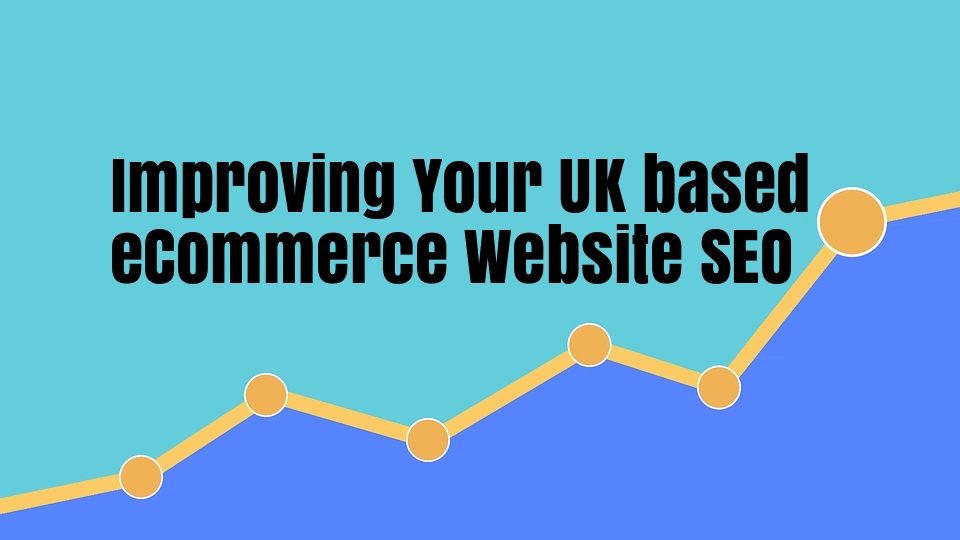Improving Your UK based eCommerce Website SEO in 5 Steps
Most eCommerce websites are built without considerations for search engine optimizations (SEO), even some top UK eCommerce sites are no exemptions, and as such rely heavily on paid campaigns.
If you run an eCommerce website in the UK, definitely you’ll like it to be easily found on search engines when your customers or prospects within the United Kingdom search for any of your keywords. But to rank in the top position of search engines like Google and Bing, especially in the UK takes a lot of hard work.
What benefit is it then to have the best services and products on your website if it can’t reach the target audience?

We understand your frustrations, so have undertaken to show you the steps for Improving your UK based eCommerce Website SEO in 5 easy Steps! Firstly, you’ll need a basic understanding of what search engine optimization (SEO) is all about.
What is SEO?
Search engine optimization (SEO) is systematic process of improving a website (divided into off-page and On-page SEO) to rank higher on the search engines, which ultimately leads to more traffic by the increase in visibility of the website or web page to users of the search engine.
The results of SEO are usually unpaid traffic from users of search engines, and quite different from paid search engine listings and also excludes direct traffics and the traffic from sponsored content placement.
Since it is unpaid, it brings those visitors that are actually interested in your products and services, haven searched for your keywords, not those simply coaxed into visiting your site through paid listings, so that makes the traffic more beneficial.
Why You Should Care about SEO
As more and more brick-and-mortar stores get online, the competition is increasingly fierce. Even with the rise of digital brands establishing physical storage facilities without actually selling products offline, but simply providing pick-up services to online orders.
According to statistics, it is expected that above 18% of all retail purchases in the UK will occur online this year (Nasdaq), with the average spend per customer, estimated to be around £1,600 in the UK over the course of the year (Smart Insights).
Additionally, over 70% of adults in the UK have bought goods/services online, and among the Millennial about 54% of their purchases happen online (UPS).
Definitely, if you are an eCommerce vendor in the UK these statistics are not to be ignored. So what are your changes of getting your online store at the front of web users without spending an arm and a leg?
5 Steps to Improve SEO for Your UK based eCommerce Website
These SEO best practices will help you rank your UK eCommerce website higher in the SERPs (search engine result pages) and make your site more visible to your target audience.
1. Get Listed on Google My Business
Getting listed on Google My Business will make your eCommerce website discoverable on Google Maps, which is a huge local SEO boost for your business. For instance, if a customer or prospects search for your brand, a detailed maps listing with direction, working hours and contact number and website will be listed on the result page.
However, if really you want your listing to show up in the UK local results, you’ll require some quality local citations. The local citations are backlinks from local websites, it essentially proves your credibility, and include the likes of press releases and feature on local media.
You should also claim your free business listing on Yellow Pages, which would also serve as local citation.
2. Site Structure
Site structure is all about how you organize your eCommerce website, and it is very crucial for eCommerce sites to have a well structured design. Irrespective of the fact that most eCommerce websites have several thousands of product pages.
The organized site structure means that you’ve mapped out how the users navigate through your site. As the users experience is increasingly a search engine ranking factor, and given that you would want the users to find it easy to identify key product pages.
SEO best practice is that the most relevant pages/content should be placed in front where users can easily find them and reduce the number of times required to finding them.
Additionally, make sure your eCommerce is mobile responsive and the site’s URLs are optimized, which help search engines’ bots to easily find and crawl your eCommerce website, as properly structured URLs ease your site indexation. Also, most clients get amazing results by deciding to move to the London server hosting.
3. Invest in Content Creation
It is very common nowadays to see eCommerce websites running a blog, such content farms help them to target their keywords more effectively and reach more people with their products and services.
There is an unwritten golden rule that content is the easiest way for your eCommerce site to rank for your keywords. The reality is that your product pages and category can only rank for some few keywords, but once you invest in contents you’ll be able to cover more of your keywords in search real estate.
Albeit, creating content just like that isn’t enough, you need to target the right keywords. And that is the key to rank your UK eCommerce website higher. Simply take some time to do keyword research in order to pick the long-tail keywords that can really help to rank your site higher on specific keywords that your competitors may not already be ranking.
4. Link Building For Your eCommerce Website
Link building is the bedrock of Off-page SEO, and can be a bit time-consuming and complicated more than simply restructuring your website.
For this, you’ll need to employ the help of Local SEO specialist or an SEO Consultancy that will collaborate with the bloggers and other website owners to help your site acquire quality backlinks.
While quality backlinks will improve your rankings and simultaneously pushing down the competition, but talking of competitions, you’ll need to track your competitors to know how strong, you can use Ahrefs to spy on their main keywords, and also to find out the source of all their links.
5. Measure Your eCommerce Website SEO Success
There is only one way to know whether the SEO of your eCommerce website is cutting any ice, that is to know how to track performance, with strong understanding of your website’s goals. Just like any business, SEO is all about improvement – and the improvement is only known if it is measurable.
But the actual measuring of SEO, is quite often easier said than it can be done. And there are several components and variables to measure in SEO with numerous metrics that are required to gauge success. As such it can be really challenging, and takes time to master the art of measuring effective SEO.
In a nutshell, it is important to have an understanding of the various aspects of measuring your website performance — like position on search engines, number of acquired and lost backlinks, DA/PA, bounce rate, and so forth — then you would be able to better uncover more opportunities.
Author Profile
- Guest Blogger & Outreach Expert - Interested in Writing Blogs, Articles in Business Niche | News Journalist By Profession in the United Kingdom
Latest entries
 Domain RegistrationJanuary 25, 2025Every UK Shop Needs a .shop Domain Name to Thrive in the Digital Age
Domain RegistrationJanuary 25, 2025Every UK Shop Needs a .shop Domain Name to Thrive in the Digital Age BloggingFebruary 4, 2022How to Create a Content Marketing Strategy Step-by-Step
BloggingFebruary 4, 2022How to Create a Content Marketing Strategy Step-by-Step Domain RegistrationApril 15, 2021How to buy domain and hosting for WordPress website or blog?
Domain RegistrationApril 15, 2021How to buy domain and hosting for WordPress website or blog? BloggingFebruary 10, 2021Top 10 Fashion Bloggers in London & their Blogs to follow in 2020
BloggingFebruary 10, 2021Top 10 Fashion Bloggers in London & their Blogs to follow in 2020


